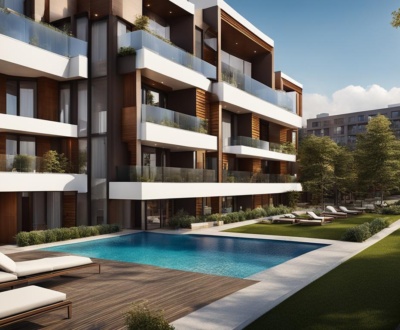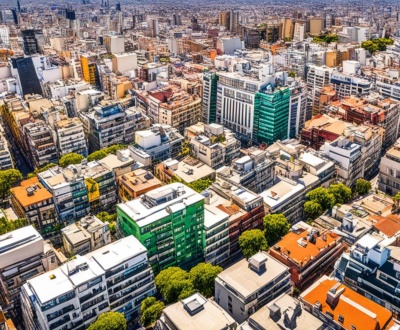Welcome to our comprehensive guide on Argentina’s real estate regulations and laws. If you’re considering investing in the Argentine property market, it’s essential to understand the legal framework and regulations that govern real estate transactions in this vibrant country. Navigating the property market in Argentina can be complex for both domestic and foreign buyers, but with the right knowledge, you can make informed decisions and maximize your investment potential.
In this guide, we will explore the key regulations and laws that relate to buying and owning property in Argentina. From understanding the rights of foreigners to purchase real estate to exploring the different ways you can participate in the Argentine real estate market, we’ve got you covered. Let’s dive in and discover everything you need to know about real estate regulations in Argentina.
- The rights of foreigners to buy property in Argentina
- The restrictions on buying land as a foreigner
- The process of becoming a resident in Argentina through real estate ownership
- The pros and cons of buying versus renting property in Argentina
- The step-by-step buying process in Argentina
- An overview of Argentina’s real estate market and current trends
- Various ways to participate in the Argentinian real estate market
Whether you’re considering purchasing a vacation home, investing in rental properties, or simply looking to diversify your real estate portfolio, understanding Argentina’s real estate regulations is crucial. By following the guidelines and laws outlined in this guide, you can confidently navigate the property market and make well-informed decisions that align with your investment goals.
Can Foreigners Buy Property in Argentina?
Foreigners have the same rights as Argentine citizens when it comes to owning real estate in Argentina, as stated in Article 20 of the Argentine Constitution. However, there are certain restrictions on the acquisition of land by foreigners, as established by Ley N° 26737.
Foreigners can buy and own property in Argentina as long as they can prove that it will benefit the local community and follow the rules set by the Ley 26.737.
Buying Land as a Foreigner in Argentina
Foreigners looking to purchase rural land in Argentina must navigate certain restrictions imposed by the Ley 26.737. These restrictions aim to protect important water sources and regulate foreign ownership of rural land in the country.
“The Ley 26.737 imposes limitations on buying land with important water sources or land near important water sources.”
Under these restrictions, foreigners are prohibited from acquiring land that has significant water sources or is located in close proximity to such sources. This regulation ensures the preservation and conservation of Argentina’s vital water resources.
“Foreigners can own only up to 15% of all rural land in Argentina.”
Additionally, Ley 26.737 stipulates that foreign ownership of rural land in Argentina is limited to a maximum of 15% of the total rural land available in the country. This restriction aims to maintain control and prevent the concentration of land ownership by foreign entities.
“Restrictions on the amount of land foreigners can own in each province.”
Furthermore, there are restrictions on the amount of land foreigners can own in each province of Argentina. These limitations vary depending on the specific regulations set by provincial authorities and are designed to ensure fair distribution of land and prevent monopolization by foreign buyers.
It is important to note that there are exceptions to these restrictions for individuals who have lived in Argentina for a certain period of time or have Argentine children. These exceptions recognize the ties that foreign individuals may have with the country and provide opportunities for their involvement in the rural land market.
Prior to purchasing rural land as a foreigner, it is necessary to obtain a special certificate from the National Rural Land Registry. This certificate confirms compliance with the legal requirements and ensures adherence to the regulations set forth by Ley 26.737.
To better understand the restrictions on foreign ownership of rural land in Argentina, refer to the table below:
Becoming a Resident in Argentina through Real Estate Ownership
Owning property in Argentina does not grant automatic permanent residency or citizenship. However, foreigners can apply for temporary residence as investors by presenting an investment project to the Dirección Nacional de Migraciones. The investment must be at least 1,500,000 Argentine pesos, and proof of the source and legality of the funds is required. The Ministry of Production will review the investment project, and if approved, the National Immigration Office will grant temporary residency for up to three years.

Buying vs. Renting in Argentina
The decision to buy or rent property in Argentina depends on individual circumstances. Buying property is a good option for those who plan to use the property for a significant amount of time or potentially retire in Argentina. However, from an economic standpoint, renting may be more advantageous in certain situations, especially considering the limited financing options and potential economic instability in the real estate market. It is important to consider factors such as location, investment opportunities, property taxes, and reselling potential.
When deciding whether to rent or buy property in Argentina, individuals should consider their long-term plans and financial goals. Here are some key points to consider:
1. Flexibility
Renting provides more flexibility for individuals who may need to move frequently or have uncertain long-term plans. This flexibility allows tenants to easily relocate or upgrade to a new property without the commitment or financial burden associated with owning real estate.
2. Financial Considerations
From a financial perspective, renting eliminates the upfront costs associated with purchasing property, such as down payments, closing costs, and property taxes. Additionally, renting provides the opportunity to invest freed-up capital in alternative investment options that may offer higher returns.
3. Market Conditions
The real estate market in Argentina experiences fluctuations and economic uncertainties. Renting allows individuals to avoid potential risks associated with owning property during economic downturns or market downturns. This flexibility can be particularly beneficial during periods of economic instability.
4. Maintenance and Responsibilities
When renting, tenants are typically responsible for paying rent and utilities, while landlords handle property maintenance and repairs. This relieves tenants of the financial and time-consuming responsibilities associated with property ownership, such as property maintenance, repairs, and renovations.
5. Long-Term Investment
Buying property in Argentina can be a profitable long-term investment, especially in areas where property values are expected to appreciate over time. Homeownership provides stability and the potential for appreciation, building equity and potentially serving as a valuable asset for retirement.
Ultimately, the decision to rent or buy property in Argentina depends on personal circumstances, financial goals, and market conditions. It is recommended to consult with a real estate professional or financial advisor to assess individual needs and evaluate the advantages and disadvantages of each option.
The Buying Process in Argentina
The process of buying real estate in Argentina involves several important steps that both local and foreign buyers need to navigate. It is crucial to be well-informed and prepared before embarking on this journey to ensure a smooth and successful property purchase.
Here are the key steps involved in the property purchasing process in Argentina:
- Find a Notary Public: A notary public plays a vital role in real estate transactions in Argentina. Their role includes drafting and reviewing legal documents, ensuring all parties understand the terms of the agreement, and overseeing the transfer of ownership.
- Obtain a Tax ID Number (CDI): To participate in real estate transactions, buyers must obtain a Código de Identificación (CDI), which is a tax identification number. This number is required for legal compliance and helps facilitate property ownership.
- Find a Real Estate Agent: Working with a licensed real estate agent can simplify the property search process, as they have access to a wide range of properties and can provide valuable guidance and negotiation support.
- Make an Initial Offer: Once you have found a suitable property, you can make an initial offer to the seller. This offer is usually subject to negotiation and can include conditions related to financing, repairs, or other terms.
- Sign a Purchase Agreement: Once the seller accepts your offer, it is important to sign a legally binding purchase agreement. This document outlines the terms and conditions of the transaction, including the sale price, payment terms, and any additional agreements.
- Complete the Title Deed Transfer: The final step in the buying process is the transfer of the title deed (escritura). This involves registering the property under the buyer’s name at the National Property Registry and paying the necessary transfer taxes and fees. Once the transfer is complete, the buyer becomes the legal owner of the property.
It is important to note that the duration and cost of each step can vary depending on factors such as the complexity of the transaction, the involvement of financing institutions, and any potential legal or administrative requirements.
Now that you have an understanding of the property purchasing process in Argentina, you can proceed with confidence and navigate the real estate market effectively.

Example Property Purchase Timeline
| Step | Duration | Cost |
|---|---|---|
| Find a Notary Public | 1-2 weeks | Varies |
| Obtain a Tax ID Number (CDI) | 1-2 days | Free |
| Find a Real Estate Agent | 1-2 weeks | Varies (commission-based) |
| Make an Initial Offer | Varies (negotiation-dependent) | Varies (deposit or reservation fee) |
| Sign a Purchase Agreement | 1-2 weeks | Varies |
| Complete the Title Deed Transfer | 1-3 months | Varies (transfer taxes and fees) |
Argentina’s Real Estate Market
The real estate market in Argentina, especially in Buenos Aires, has experienced a period of declining prices in recent years. Factors such as economic crisis, inflation, and the impact of the COVID-19 pandemic have contributed to this trend. However, despite these challenges, there are still opportunities for investment in the country’s property market.
It is important to closely monitor market indicators, such as the Real Estate Market Index, and stay updated on market trends to make informed investment decisions. While the overall market may be experiencing a decline, there are specific areas of Argentina and property types that are still showing promising growth and potential.
Developing areas, such as emerging neighborhoods in Buenos Aires, present opportunities for investors looking for future appreciation. These areas often offer more affordable prices compared to well-established neighborhoods, making it an attractive option for both local and foreign buyers.
Market Trends and Property Prices
The real estate market in Argentina is constantly evolving, and it is essential to keep track of the latest trends and property prices. Throughout the country, there may be variations in property prices depending on location, amenities, and demand. It is recommended to consult with local real estate agents or research reliable property portals to gain insights into current market prices in specific areas of interest.
“By staying informed about market trends and exploring emerging areas, investors can identify opportunities for potential growth and profitability in the Argentine real estate market.” – Local Real Estate Expert
Investment Strategies in Argentina
Investing in the Argentine real estate market may require a strategic approach. While property prices may be lower due to the current market conditions, it is important to carefully analyze each investment and consider factors such as location, rental potential, and future development plans. Diversifying investments across different property types, such as residential, commercial, or vacation rentals, can also help mitigate risks and maximize returns.
Additionally, taking advantage of government incentives and tax benefits can further enhance the investment opportunities in Argentina. These incentives may include exemptions or reductions in property transfer taxes for specific types of investments.
Market Outlook
Despite the challenges faced by the Argentine real estate market, the country’s long-term growth potential and attractive investment opportunities continue to draw attention from both local and foreign investors. As the economy stabilizes and the effects of the pandemic subside, the market is expected to gradually recover, potentially leading to an increase in property prices and investment activity.
Investors looking to capitalize on the potential of the Argentine real estate market should thoroughly research the market, consult with local experts, and carefully evaluate each investment opportunity. By staying informed and proactive, investors can navigate the market and make sound investment decisions that align with their financial goals and risk tolerance.
Different Ways to Participate in the Argentinian Real Estate Market
For investors interested in the Argentinian real estate market, there are three primary avenues to consider: owning real estate directly, participating as a shareholder in a real estate company, or participating in a real estate trust. Each option presents its own set of advantages and considerations, and understanding the legal and financial implications is crucial for making an informed investment decision.
Owning Real Estate Directly
Owning real estate directly entails purchasing and holding property in Argentina. This option provides investors with full ownership and control over the property, allowing them to benefit from potential appreciation and rental income.
Participating as a Shareholder in a Real Estate Company
Another option is to become a shareholder in a real estate company operating in Argentina. By investing in a real estate company, investors gain exposure to a diversified portfolio of properties managed by experienced professionals. This option allows for indirect real estate ownership and the potential for regular dividends.
Participating in a Real Estate Trust
Investors can also participate in a real estate trust, also known as a real estate investment trust (REIT). A real estate trust is a company that owns and operates income-generating properties, and by investing in a trust, individuals can gain exposure to a diverse portfolio of real estate assets. Real estate trusts are attractive for their liquidity and the ability to passively invest in the real estate market.
“Investing in real estate provides opportunities for wealth growth and diversification. Whether you choose to own property directly, participate as a shareholder, or invest in a real estate trust, it is essential to carefully assess each option’s benefits, risks, and alignment with your investment goals.”
Each of these approaches offers unique benefits and considerations, and the choice ultimately depends on individual preferences and investment objectives. It is advisable to consult with a qualified real estate professional or investment advisor experienced in the Argentinian market to evaluate the available options.
Conclusion
The Argentina Real Estate Guide serves as a comprehensive resource for domestic and foreign investors looking to capitalize on the opportunities available in Argentina’s real estate market. With a firm understanding of the country’s housing laws and regulations, buyers can make informed decisions that lead to successful property investments.
Investing in Argentine real estate offers numerous advantages for both short-term and long-term gains. By carefully navigating the complexities of the market, buyers can take advantage of attractive property prices and potential appreciation. The Property Investment Guide Argentina provides valuable insights and information to help investors thrive in this dynamic market.
Whether you are considering purchasing a property for personal use, rental income, or as a long-term investment, the Argentina Real Estate Guide offers essential guidance for the entire buying process. From understanding property ownership rights to the intricacies of the purchasing process, this guide equips buyers with the knowledge needed to navigate the market confidently.
By utilizing the insights provided in the Argentina Real Estate Guide, investors can make educated decisions that align with their financial goals. Whether you are a domestic or foreign buyer, this guide is an invaluable tool for navigating the Argentinian real estate market and maximizing your property investment potential.
More from our blog
See all postsRecent Posts
- Argentina Property Management: Expert Care & Services February 2, 2024
- Understanding Argentina Real Estate Law Essentials February 2, 2024
- Argentina Luxury Apartments: Upscale Living February 1, 2024










